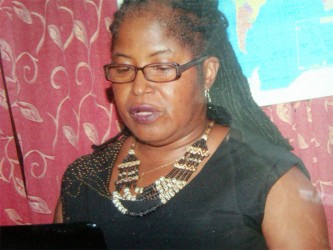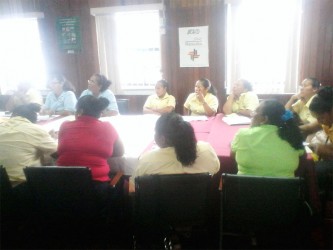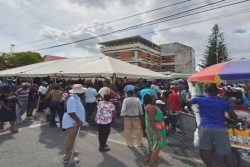Since 1996, Inter-American Institute for Cooperation in Agriculture (IICA) Agricultural Health and Food Specialist Dr Maxine Parris-Aaron has been working with the Women Agro Processors Development Network. This is in an effort to raise standards amongst the enterprising women in Regions One, Two, Four, Five and Nine, who continue to seek to move their skills at creating value-added foods out of farm produce beyond their cramped kitchens.
It is not an initiative that promises the dramatic transformation of either the lives of the participants or the country’s food sector. The women in the Network—more often than not—have little if any access to the urban amenities, the funding and the facilities that would otherwise help them to keep pace with the higher profile projects which, relatively speaking, thrive in urban communities. Dr Parris-Aaron believes, however, that given the strategic support that expert intervention can provide, projects like the Network can make a difference by helping to stave off poverty and infuse a measure of meaning into the lives of the participants. Individuals, families and entire communities can be transformed by such projects.

Dr Maxine Parris-Aaron
Some evidence of progress has been manifesting itself over the years. The skills of the women have already grown beyond what was once the mostly manual pursuit of transforming agricultural produce cultivated on modest plots into condiments. The women are now working with basic but effective food-processing equipment, evidence of their incremental progress under the guidance of the IICA Specialist. They are, these days, paying far more attention to expanding their markets beyond their immediate communities, developing orthodox business skills including, crucially, marketing and product-presentation skills and, through their work, inculcating an enhanced sense of self-esteem.
What the IICA Specialist says she values highly are the accomplishments the group has realized from its networking pursuits. Members have been learning from each other and using ideas garnered from each other to enhance what they do in their own communities.
Mindful not to oversell the accomplishments of the project, Dr Aaron-Parris locates its accomplishments within the context of small communities with as yet limited ambitions, which, for the moment at least, do not extend much beyond self-reliance. Amongst the women, product acceptance in coastal markets is still a major achievement, their limitations reposing chiefly in the challenges they face in meeting the standards of packaging and labelling that would accord their products a profile that at least holds up well against the volumes of imported goods which, these days, are to be found on urban supermarket shelves.

Their urban marketing opportunities are located mostly in the openings provided by the display space afforded by the Guyana Marketing Corporation’s Guyana Shop and the opportunities afforded by events like GuyExpo. The ambition of export markets, Parris-Aaron says, is still a long way off. Still, she insists that contextually the women have made strides, cultivating considerable skills and experience in the process.
Over the next five years, she says, the women in the Network will have to set and accomplish fresh goals if they are to take the project forward. They will have to learn techniques designed to keep their costs of production down; they will have to refine still further their marketing techniques including those associated with product presentation and they will have to refine their business skills to the point that allows them to trade on a level playing field with experienced merchants in more mature markets.
In a tough and demanding business environment there have been some rewards for the efforts of the women in the Network. Those interior production centres have benefited from the patronage of the mining community which provides a ready market for their peanut butter. Parris-Aaron disclosed that interior production centres have recently been set a major challenge arising out of the announcement by the Canadian mining company Guyana Goldfields that it will be in market for some food items which can be produced at interior production centres. That is a market, Parris-Aaron says, which the women in the network are likely to go after.
There are some accomplishments that have been realized, which have served to energize the Network: like the $12.6 million grant from the International Fund For Agricultural Development (IFAD) which Parris-Aaron says, is being used to help equip eleven groups within the Network with information technology equipment to support the management of their work and to create a website to support marketing and promotion. Some of the funds, Parris-Aaron says, will be used to purchase industrial blenders to enhance the efficiency of the production process whilst a revolving fund is being contemplated to provide modest short-term business loans to the project participants.
Every day brings a new learning experience and Parris-Aaron says that exposure to competition has taught the women to realize just how far away they still are from where they want to be. She says that much of her focus is on getting her charges to understand the nexus between training and applying one self and taking steps in the right direction.
Kitco Market Data Gold Prices for the three day period ending Thursday March 12, 2015





